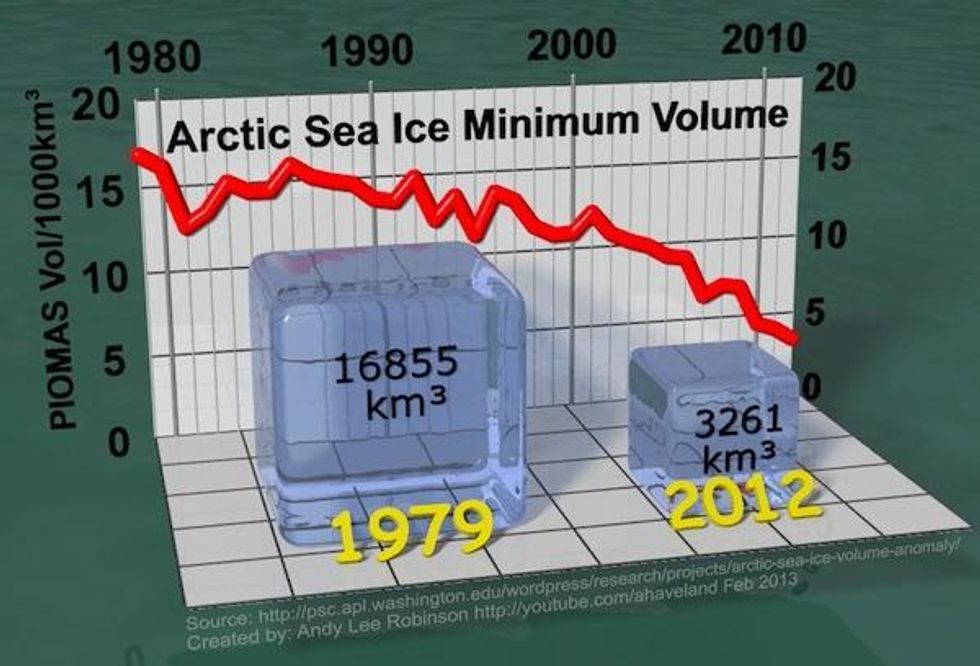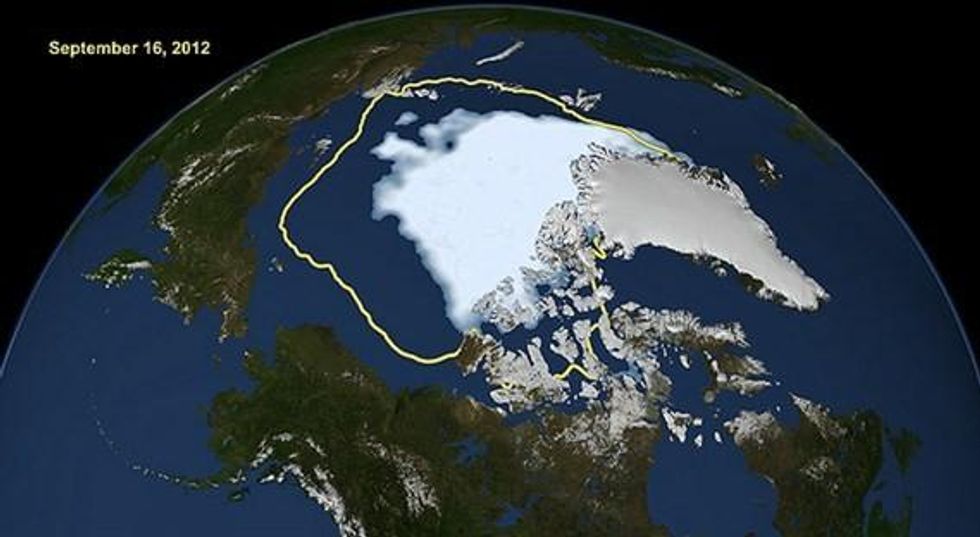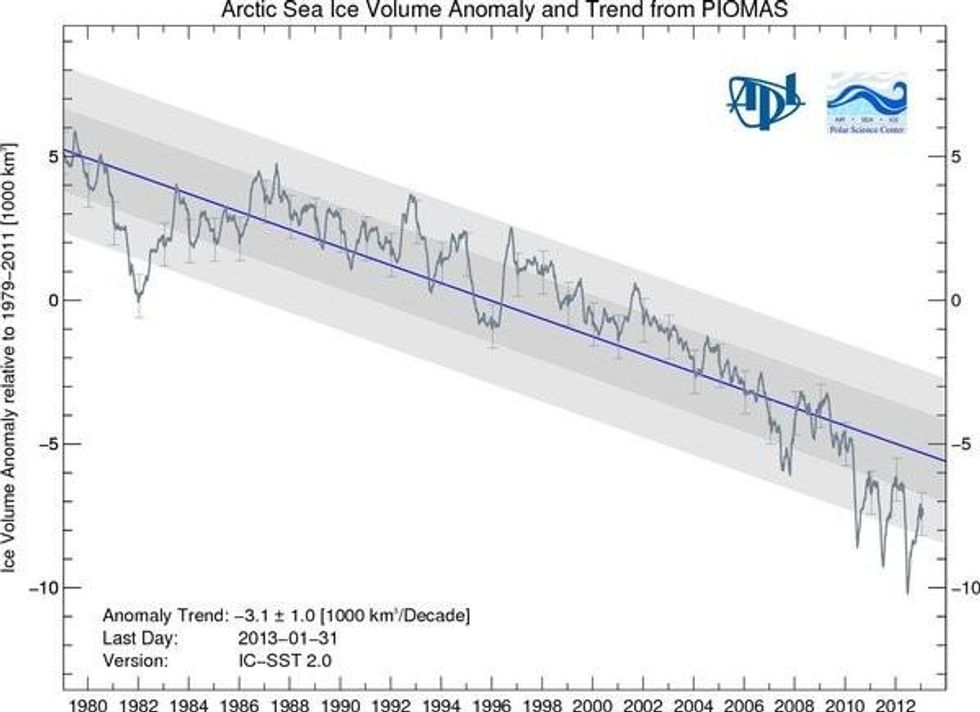

SUBSCRIBE TO OUR FREE NEWSLETTER
Daily news & progressive opinion—funded by the people, not the corporations—delivered straight to your inbox.
5
#000000
#FFFFFF
To donate by check, phone, or other method, see our More Ways to Give page.


Daily news & progressive opinion—funded by the people, not the corporations—delivered straight to your inbox.

The alarming rate of melting was measured by the European Space Agency's CryoSat-2 satellite, which uses new technology to measure the thickness of the sea ice in addition to how much of the region is covered.
While ice thickness is more difficult to see with the naked eye, its decline in volume is a harbinger of faster and more alarming ice loss, the scientists urged.
"Not only is the area getting smaller, but also its thickness is decreasing and making the ice more vulnerable to more rapid declines in the future," Christian Haas, a geophysicist at York University in Canada, told NBC News.
The Arctic sea already hit record lows in 2012 with the lowest amount of ice on record, covering only half the average area covered between 1979 and 2012.
The newly released data confirms earlier reports--which included data from NASA's ICESat satellite between 2003 to 2008--that the Arctic, which normally maintains vast amounts of ice throughout the year, may soon be ice-free during warmer months. Another team of scientists came to the same conclusion in September using the Pan-Arctic Ice Ocean Modeling and Assimilation System (PIOMAS) at the University of Washington's Polar Science Center.
"As the satellite measurements show that not only the area decreases but also its thickness, it is actually becoming more likely that the ice will disappear sooner rather than later," Haas told NBC News.
Researchers published the study online in Geophysical Research Letters. "Other people had argued that 75 to 80 percent ice volume loss was too aggressive," said co-author Axel Schweiger in a press release. "What this new paper shows is that our ice loss estimates may have been too conservative, and that the recent decline is possibly more rapid."
The Natural Environment Research Council (NERC), commented on the new findings in a press release:
Arctic sea ice volume has declined by 36 per cent in the autumn and 9 per cent in the winter between 2003 and 2012, a UK-led team of scientists has discovered....
The findings confirm the continuing decline in Arctic sea-ice volume simulated by the Pan-Arctic Ice-Ocean Modelling & Assimilation System (PIOMAS), which estimates the volume of Arctic sea ice and had been checked using earlier submarine, mooring, and satellite observations until 2008.
BBC News adds more details:
The data gathered so far by Cryosat were compared with information compiled by the US space agency's (Nasa) Icesat spacecraft in the mid-2000s.
For autumn (October/November), the analysis found the Icesat years from 2003 to 2008 to have recorded an average volume of 11,900 cubic km.
But from 2010 to 2012, this average had dropped to 7,600 cu km - a decline of 4,300 cu km - as observed by Cryosat.
For winter (February/March), the 2003 to 2008 period saw an average of 16,300 cu km, dropping to 14,800 cu km between 2010 and 2012 - a difference of 1,500 cu km.
The smaller relative decline in winter volume highlights an interesting "negative feedback".


Dear Common Dreams reader, The U.S. is on a fast track to authoritarianism like nothing I've ever seen. Meanwhile, corporate news outlets are utterly capitulating to Trump, twisting their coverage to avoid drawing his ire while lining up to stuff cash in his pockets. That's why I believe that Common Dreams is doing the best and most consequential reporting that we've ever done. Our small but mighty team is a progressive reporting powerhouse, covering the news every day that the corporate media never will. Our mission has always been simple: To inform. To inspire. And to ignite change for the common good. Now here's the key piece that I want all our readers to understand: None of this would be possible without your financial support. That's not just some fundraising cliche. It's the absolute and literal truth. We don't accept corporate advertising and never will. We don't have a paywall because we don't think people should be blocked from critical news based on their ability to pay. Everything we do is funded by the donations of readers like you. Will you donate now to help power the nonprofit, independent reporting of Common Dreams? Thank you for being a vital member of our community. Together, we can keep independent journalism alive when it’s needed most. - Craig Brown, Co-founder |
Jacob Chamberlain is a former staff writer for Common Dreams. He is the author of Migrant Justice in the Age of Removal. His website is www.jacobpchamberlain.com.

The alarming rate of melting was measured by the European Space Agency's CryoSat-2 satellite, which uses new technology to measure the thickness of the sea ice in addition to how much of the region is covered.
While ice thickness is more difficult to see with the naked eye, its decline in volume is a harbinger of faster and more alarming ice loss, the scientists urged.
"Not only is the area getting smaller, but also its thickness is decreasing and making the ice more vulnerable to more rapid declines in the future," Christian Haas, a geophysicist at York University in Canada, told NBC News.
The Arctic sea already hit record lows in 2012 with the lowest amount of ice on record, covering only half the average area covered between 1979 and 2012.
The newly released data confirms earlier reports--which included data from NASA's ICESat satellite between 2003 to 2008--that the Arctic, which normally maintains vast amounts of ice throughout the year, may soon be ice-free during warmer months. Another team of scientists came to the same conclusion in September using the Pan-Arctic Ice Ocean Modeling and Assimilation System (PIOMAS) at the University of Washington's Polar Science Center.
"As the satellite measurements show that not only the area decreases but also its thickness, it is actually becoming more likely that the ice will disappear sooner rather than later," Haas told NBC News.
Researchers published the study online in Geophysical Research Letters. "Other people had argued that 75 to 80 percent ice volume loss was too aggressive," said co-author Axel Schweiger in a press release. "What this new paper shows is that our ice loss estimates may have been too conservative, and that the recent decline is possibly more rapid."
The Natural Environment Research Council (NERC), commented on the new findings in a press release:
Arctic sea ice volume has declined by 36 per cent in the autumn and 9 per cent in the winter between 2003 and 2012, a UK-led team of scientists has discovered....
The findings confirm the continuing decline in Arctic sea-ice volume simulated by the Pan-Arctic Ice-Ocean Modelling & Assimilation System (PIOMAS), which estimates the volume of Arctic sea ice and had been checked using earlier submarine, mooring, and satellite observations until 2008.
BBC News adds more details:
The data gathered so far by Cryosat were compared with information compiled by the US space agency's (Nasa) Icesat spacecraft in the mid-2000s.
For autumn (October/November), the analysis found the Icesat years from 2003 to 2008 to have recorded an average volume of 11,900 cubic km.
But from 2010 to 2012, this average had dropped to 7,600 cu km - a decline of 4,300 cu km - as observed by Cryosat.
For winter (February/March), the 2003 to 2008 period saw an average of 16,300 cu km, dropping to 14,800 cu km between 2010 and 2012 - a difference of 1,500 cu km.
The smaller relative decline in winter volume highlights an interesting "negative feedback".


Jacob Chamberlain is a former staff writer for Common Dreams. He is the author of Migrant Justice in the Age of Removal. His website is www.jacobpchamberlain.com.

The alarming rate of melting was measured by the European Space Agency's CryoSat-2 satellite, which uses new technology to measure the thickness of the sea ice in addition to how much of the region is covered.
While ice thickness is more difficult to see with the naked eye, its decline in volume is a harbinger of faster and more alarming ice loss, the scientists urged.
"Not only is the area getting smaller, but also its thickness is decreasing and making the ice more vulnerable to more rapid declines in the future," Christian Haas, a geophysicist at York University in Canada, told NBC News.
The Arctic sea already hit record lows in 2012 with the lowest amount of ice on record, covering only half the average area covered between 1979 and 2012.
The newly released data confirms earlier reports--which included data from NASA's ICESat satellite between 2003 to 2008--that the Arctic, which normally maintains vast amounts of ice throughout the year, may soon be ice-free during warmer months. Another team of scientists came to the same conclusion in September using the Pan-Arctic Ice Ocean Modeling and Assimilation System (PIOMAS) at the University of Washington's Polar Science Center.
"As the satellite measurements show that not only the area decreases but also its thickness, it is actually becoming more likely that the ice will disappear sooner rather than later," Haas told NBC News.
Researchers published the study online in Geophysical Research Letters. "Other people had argued that 75 to 80 percent ice volume loss was too aggressive," said co-author Axel Schweiger in a press release. "What this new paper shows is that our ice loss estimates may have been too conservative, and that the recent decline is possibly more rapid."
The Natural Environment Research Council (NERC), commented on the new findings in a press release:
Arctic sea ice volume has declined by 36 per cent in the autumn and 9 per cent in the winter between 2003 and 2012, a UK-led team of scientists has discovered....
The findings confirm the continuing decline in Arctic sea-ice volume simulated by the Pan-Arctic Ice-Ocean Modelling & Assimilation System (PIOMAS), which estimates the volume of Arctic sea ice and had been checked using earlier submarine, mooring, and satellite observations until 2008.
BBC News adds more details:
The data gathered so far by Cryosat were compared with information compiled by the US space agency's (Nasa) Icesat spacecraft in the mid-2000s.
For autumn (October/November), the analysis found the Icesat years from 2003 to 2008 to have recorded an average volume of 11,900 cubic km.
But from 2010 to 2012, this average had dropped to 7,600 cu km - a decline of 4,300 cu km - as observed by Cryosat.
For winter (February/March), the 2003 to 2008 period saw an average of 16,300 cu km, dropping to 14,800 cu km between 2010 and 2012 - a difference of 1,500 cu km.
The smaller relative decline in winter volume highlights an interesting "negative feedback".

